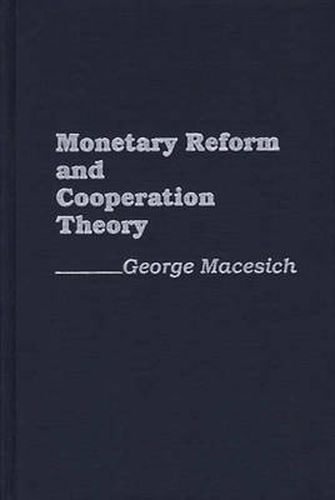Readings Newsletter
Become a Readings Member to make your shopping experience even easier.
Sign in or sign up for free!
You’re not far away from qualifying for FREE standard shipping within Australia
You’ve qualified for FREE standard shipping within Australia
The cart is loading…






This volume demonstrates how monetary and financial organizations in the United States and abroad can be improved through a new addition to traditional monetary policy. Cooperation theory, a system developed from games theory, is shown to provide an appropriate action/reaction approach that can lead to cooperation without abandoning the free market. Institutional, theoretical, and empirical results of game theory, computer simulation, monetary theory, and policy analysis are woven together so that each reinforces the other. The text clearly stresses that although unilateral, noncooperative action may result in short-term advantage for an organization, it ultimately leads to long-term losses for all in the economic system.
Monetary Reform and Cooperation Theory opens with a discussion of cooperation theory. It goes on to address improving the monetary financial organization. Bureaucracy and philosophy are analyzed, along with reform in the banking industry and banking in other countries. The book concludes with issues of international creditors and debtors. This work is full of useful information for the general economist, political scientist, and layman on the complex issue of monetary reform and the positive role cooperation theory can play in this vital process.
$9.00 standard shipping within Australia
FREE standard shipping within Australia for orders over $100.00
Express & International shipping calculated at checkout
This volume demonstrates how monetary and financial organizations in the United States and abroad can be improved through a new addition to traditional monetary policy. Cooperation theory, a system developed from games theory, is shown to provide an appropriate action/reaction approach that can lead to cooperation without abandoning the free market. Institutional, theoretical, and empirical results of game theory, computer simulation, monetary theory, and policy analysis are woven together so that each reinforces the other. The text clearly stresses that although unilateral, noncooperative action may result in short-term advantage for an organization, it ultimately leads to long-term losses for all in the economic system.
Monetary Reform and Cooperation Theory opens with a discussion of cooperation theory. It goes on to address improving the monetary financial organization. Bureaucracy and philosophy are analyzed, along with reform in the banking industry and banking in other countries. The book concludes with issues of international creditors and debtors. This work is full of useful information for the general economist, political scientist, and layman on the complex issue of monetary reform and the positive role cooperation theory can play in this vital process.